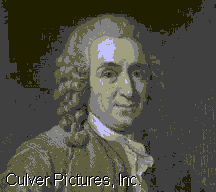
Carolus Linnaeus
Source: Microsoft® Encarta® 96 Encyclopedia
Please do not plagiarize.
If you would like to use this information in a print or electronic publication, please ask me for permission first and cite this page as:
Knapp, Robbin D. 2002.
"Robb's On-line Multimedia Database of Animals and Plants".
In Robb's Homepage.
Jan. 17, 2002.
This is an attempt to catalog some of the world's organisms in a hierarchical manner from kingdoms on down to species and subspecies.
Each page will cover one level of classification and have links to some of the subcategories.
I will try to include pictures, film sequences, text and sounds from various sources.
The source citations are often links to other sites on the Web.
Of course such a project can never be considered complete due simply to the astronomical amount of data and amount of time required (I'm doing this as a hobby in my spare time).
I've chosen Linnaeus to illustrate this page as he is considered the father of biological nomenclature.
Kingdoms of Living Beings
- Archaea (Archaeons):
described in 1996, ancient organisms with characteristics of Prokarya and Eukarya but distinct from both
- Prokarya (Prokaryotae, Procarya, Prokaryotes, Procaryotes):
formerly known as Monera, organisms without cell nuclei
- Bacteria including cyanobacteria (formerly known as Cyanophyta or blue-green algae)
- Eukarya (Eukaryotae, Eucarya, Eukaryotes, Eucaryotes): organisms with eucaryotic cells (cells with "true nuclei")
- Protista (Protoctista, Protists):
lower, mostly unicellular organisms
- Fungi (Funguses):
single-celled or multicellular organisms that obtain food by direct absorption of nutrients
- Plantae (Plants):
multicellular organisms that manufacture nutrients from inorganic substances by means of photosynthesis
- Animalia (Animals):
multicellular organisms that obtain energy by ingesting food and that have cells organized into tissues
Superphyla:
- Parazoa
- Mesozoa
- Radiates
- Acoelomate Bilateria
- Pseudocoelomates
- Eucoelomates: Tentaculata
- Eucoelomates: Trochozoa
- Eucoelomates: Deuterostomia (Deuterostomes): "higher animals"
King Philip chews on funny ginger snaps.
Sources:
Related Links:
|



